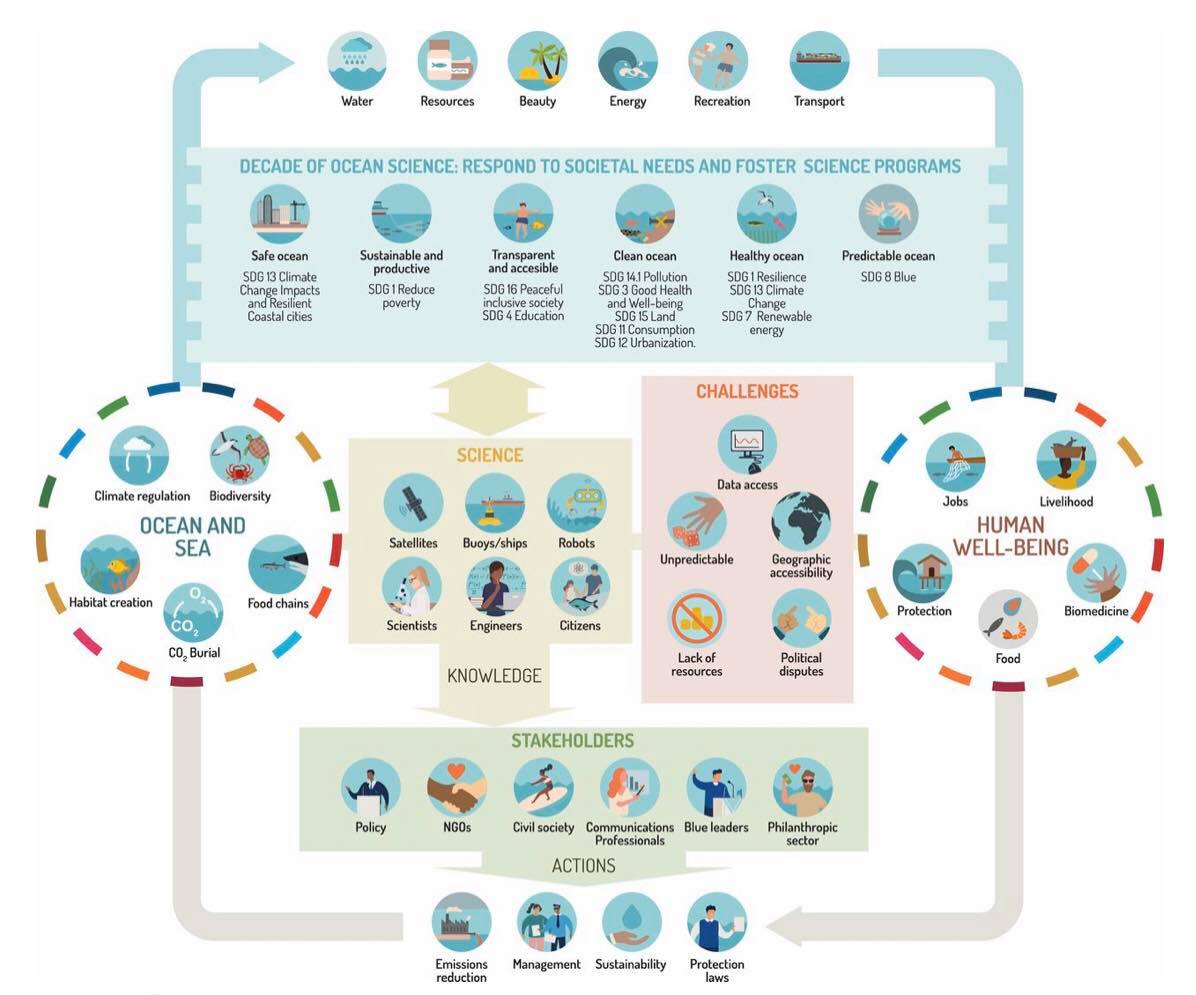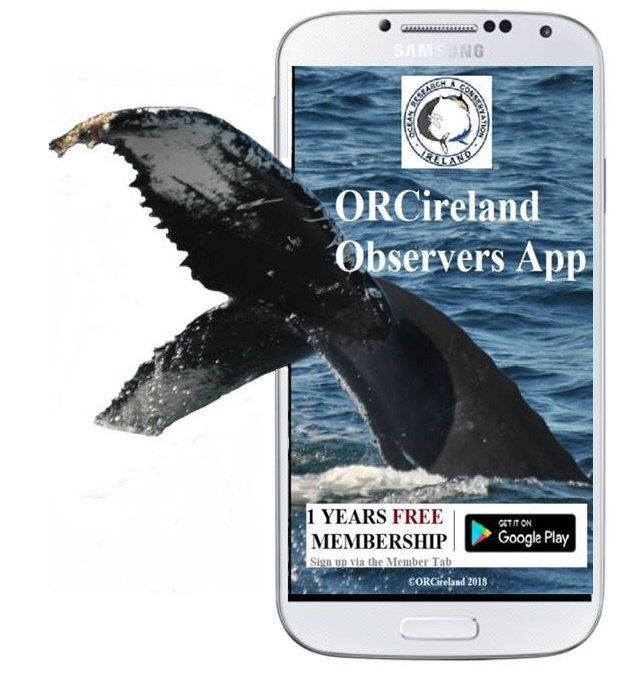Human Well Being is Directly Linked with our Oceans Health!
The United Nations (UN) General Assembly has called for a 'Decade of Ocean Science for Sustainable Development' (2021 - 2030). The aim is to create a new movement for bringing together researchers and stakeholders from all relevant sectors to generate new scientific processes to inform policies to ensure a well functioning, productive, resilient and sustainable ocean and to support the UN 2030 Agenda for Sustainable Development and associated Sustainable Development Goals (SDGs).
The UN Decade of Ocean Science for Sustainable Development. Image credit: Vanessa Gonzalez-Ortiz.
The Organisation for Economic Cooperation and Development (OECD) estimates that by 2030, $3 trillion USD will be generated annually from ocean sectors such as transportation, fishing, tourism, and energy, highlighting the economic value of our ocean ecosystems.
Nearly 40% of the world's population lives within 100 km of the coast. More than 600 million people live in low laying coastal zones, and this is expected to grow to more than 1 billion people by 2050. These coastal zones are hot-spots for human/ocean interactions, with elevated threats for wildlife such as pollution, over- exploitation and habitat degradation, but also threat to humans from climate change in the form of increased storm surges and tsunami's, sea level rise and associated coastal erosion.
A sustainable coastal zone requires an improved capacity to monitor and measure the ocean, its health, and the ability to create better predictions to relay to policy decision makers to help stakeholders understand future ocean-related impacts, so they can better regulate the human use of coastal ecosystems. Thus, measurements of ocean conditions (e.g. ocean acidity, nitrification and ecological health are of prime importance as they are directly linked with human health. Many aspects of the subsurface ocean are still not fully understood, which includes basic oceanography and biodiversity. This is particularly relevant in the polar regions, on the seabed. on the high seas, and in deep sea areas.
What is particularly poignant is that these are resource rich areas that are subject to quickly changing international policy, including new treaties for the management of the high seas, new leases for seafloor mining, and proposed measures to protect biodiversity in areas beyond national jurisdiction. All of which require to be informed by high quality knowledge, data and science.
Until these vast areas are better understood, they will continue to be the target of exploitation of mineral an energy extraction, and efforts to manage fisheries and ocean industries will neither be properly informed, nor effective in reducing impacts and risks involved with these potentially threatening uses. As the full scale of the benefits the ocean ecosystem provides to humans remains poorly understood, little is known about the significance of biodiversity loss and habitat changes. We need to know when we are approaching key tipping points, so our responses to ocean distastes can be more timely and effective.
A lack of ocean data over a long period of time adds to this problem, and remains a key issue in understanding how the oceans respond to human pressures such as fishing, shipping, mining, and coastal agriculture development. This highlights the importance of data streams from long- term monitoring and ecological research, particularly the use of citizen science. Private data streams from businesses and industry - for example, those used to route ships and exploit marine resources - are never shared publicly. Thus, better means of collection, sharing and accessing data would improve our ability to conduct interdisciplinary science on regional and global scales.
To address these issues, in line with the need to nurture ocean sciences for sustainable development; Ocean Research & Conservation Ireland aims to:
- Identify and routinely measure essential variables related to climate, ocean processes and ecological indicators (i.e. marine megafauna) which serve as sentinels of ocean health.
- In associate with industry we aim to develop low cost technologies, including new sensors and new methodological approaches to monitor these ocean variables.
- Establish new public-private partnerships in ocean observing, starting with promoting the Observers App
to generate "Big Data" to help deliver communication between science, engineering and information technology communities.
- Develop new tracking and prediction technologies to support integrated, multi- hazard, early warning systems to improve community preparedness and awareness.
-Establish innovative ways to share data, information and knowledge among all stakeholders in an open, transparent and equitable manner.
- Generate scientific capacity to create new ways of training, mobilising resources, sharing of infrastructure and exchanging experts and knowledge across nations, institutions, and disciplines.
Most of the public are aware that pressures such as overfishing and pollution have a major impact on the ocean, however, few understand how the ocean functions, the services it provides, or how their day to day activity might be impacting the oceans. Although improved management and conservation have helped reduce threats and restore some key ecosystems, overall the basic benefits that people receive from the ocean is in decline. If left unchecked, an increasing resource-hungry human population will add pressures on the ocean that may be irreversible.
Scientific research, experimentation, data collection, monitoring and modelling provide the knowledge, framework and evidence needed to explore the environmental consequences of policy and development proposals and thus chart a sustainable future. Unfortunately, the current scale, pace and practice of ocean scientific discovery and observation is not keeping up with the changes in ocean conditions.
© Ocean Research & Conservation Ireland (ORCireland) and www.orcireland.ie , est. 2017. If you like our blogs on the latest news in marine science and would like to support our work, visit www.orcireland.ie to become a member, to volunteer or to make a donation today. This article has been composed based on credible sources.
References
:
- B. Neumann, A. T. Vafeidis, J. Zimmermann, R. J. Nicholls
, Future coastal population growth and exposure to sea-level rise and coastal flooding: A global assessment. PLoS One10, e0118571 (2015).
- G. Fauville et al ., Development of the International Ocean Literacy Survey: Measuring knowledge across the world. Environ. Educ. Res. 4622, 1–26 (2018).
- IPBES , Global assessment report on biodiversity and ecosystem services of the Intergovernmental Science-Policy Platform on Biodiversity and Ecosystem Services, E. S.Brondizio, J. Settele, S. Díaz, H. T. Ngo, Eds. (IPBES Secretariat, Bonn, Germany, 2019).
- K. A. Alexander et al ., Progress in integrating natural and social science in marine ecosystem-based management research. Mar. Freshw. Res. 70, 71–83 (2019).
- OECD , The Ocean Economy in 2030. (OECD, Paris, France, 2016). https:/doi.org/10.1787/9789264251724-en.
- Pendleton, L., Evans, K., Visbeck, M., (2020). Opinion: we need a global movement to transform ocean science for a better world. Proceedings of the National Academy of Sciences of the United States of America.
- United Nations , The First Global Integrated Marine Assessment, (Cambridge University Press, 2016). https:/doi.org/10.1017/9781108186148.
- United Nations , The Conservation and Sustainable Use of Marine Biological Diversity of Areas Beyond National Jurisdiction (United Nations, 2017) https:/doi.org/10.18356/29045c1f-en.
SHARE THIS ARTICLE















